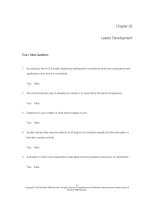Lecture Leadership: Enhancing the lessons of experience (4/e) – Chapter 1
Bạn đang xem bản rút gọn của tài liệu. Xem và tải ngay bản đầy đủ của tài liệu tại đây (385.34 KB, 10 trang )
11
McGrawHill/Irwin
© 2002 The McGrawHill Companies, Inc., All Rights Reserved.
C
HAPTER
O
NE
Leadership Is
Everyone’s Business
Leadership Is a Process, Not a
Position
Leader
Followers
McGrawHill/Irwin
Leadership
Situation
© 2002 The McGrawHill Companies, Inc., All Rights Reserved.
13
Leadership Defined
• The creative and directive force of morale
(Munson, 1921).
• The process by which an agent induces a
subordinate to behave in a desired manner
(Bennis, 1959).
• The presence of a particular influence
relationship between two or more persons
(Hollander & Julian, 1969).
McGrawHill/Irwin
© 2002 The McGrawHill Companies, Inc., All Rights Reserved.
14
Leadership Defined continued
• Directing and coordinating the work of group
members (Fiedler, 1967).
• An interpersonal relations in which others comply
because they want to, not because they have to
(Merston, 1969, Hogan, Curphy, & Hogan, 1994).
• Transforming followers, creating visions of the
goals that may be attained, and articulating for the
followers the ways to attain those goals (Bass,
1985; Tichy & Devanna, 1986).
McGrawHill/Irwin
© 2002 The McGrawHill Companies, Inc., All Rights Reserved.
15
Leadership Defined continued
• The process of influencing an organized
group toward accomplishing its goals
(Roach & Behling, 1984).
• Actions that focus resources to create
desirable opportunities (Campbell, 1991).
• The leader’s job is to create conditions for
the team to be effective (Ginnett, 1996.)
McGrawHill/Irwin
© 2002 The McGrawHill Companies, Inc., All Rights Reserved.
16
Leadership
The process of influencing an organized
group toward accomplishing its goals
Leadership Is Both Rational and
Emotional.
Rational techniques
McGrawHill/Irwin
Emotional appeals
© 2002 The McGrawHill Companies, Inc., All Rights Reserved.
18
Distinctions Between Managers and
Leaders
19
Leaders
•
•
•
•
•
•
•
McGrawHill/Irwin
Managers
Innovate
Develop
Inspire
Take the longterm view
Ask what and why
Originate
Challenge the status
quo.
Administer
Maintain
Control
Have a shortterm view
Ask how and when
Imitate
Accept the status quo
© 2002 The McGrawHill Companies, Inc., All Rights Reserved.
Myths That Hinder Leadership
Development
• Good leadership is all common sense.
• Leaders are born, not made.
• The only school you learn leadership
from is the school of hard knocks.
McGrawHill/Irwin
© 2002 The McGrawHill Companies, Inc., All Rights Reserved.
110









